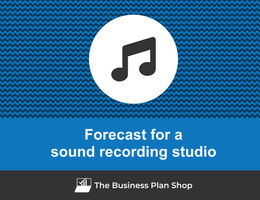How to write the business plan for a recording studio

Writing a business plan for a recording studio can be an intimidating task, whether you are starting up or looking to grow your existing business.
But it doesn't have to be this way! With the right information, tools and guidance, anyone can create an effective plan that will help them reach their goals.
In this in-depth guide, we'll cover why it's important to write a business plan for a recording studio, what information is needed and what should be included in the document. We'll also provide some useful tools that can make writing your own business plan easier and faster.
Ready? Let's get started!
Why write a business plan for a recording studio?
Before we dive into the actual content of the business plan, let's take a minute to remind ourserlves why we are doing this exercise in the first place.
To set a clear roadmap
Writing a business plan for a recording studio is an essential part of running a successful music production business. It forces entrepreneurs to look into the future and set measurable objectives for their company over the next 3-5 years.
This can be especially useful for startups, as it helps them understand if the business idea can be viable, while existing studios can use it to reassess and revise their goals for the future.
A well-crafted business plan will not only ensure that your recording studio has a clear roadmap but also give you peace of mind knowing that all aspects of your venture have been carefully thought about.
To get clarity on your cash flow
A carefully crafted business plan also provides you with an accurate financial forecast which you can compare your progress against on a regular basis.
This is key to ensure your studio remains a viable and profitable business, with enough cash in the bank.
To secure financing
Writing a business plan for a recording studio is also essential if you are looking to secure financing from a bank.
A well-crafted business plan will provide the lender with an understanding of your goals and objectives, as well as how you intend to use their money to start or grow your business.
It should also include financial projections based on market research, which demonstrate the ability to repay the bank in time.
By taking the time to create this comprehensive document, you can show that you have done your due diligence in assessing risks and opportunities associated with starting or growing your recording studio.
Similarly, a business plan is also essential for attracting and securing financing from equity investors.
Investors will review your plan carefully in order to assess if their investment can generate an attractive return on investment.
To do so, they will be looking for evidence that your recording studio has potential for healthy growth, profitability and cash flow generation over time.
Crafting a comprehensive yet concise business plan is key to getting an investor’s attention and convincing them that investing in your project makes financial sense.
Now that you know why it’s important to create a business plan for a recording studio, let's look at the information needed to create one.
What information is needed to create a business plan for a recording studio?
Carrying out market research for a recording studio
It is important to carry out market research before writing a business plan for a recording studio in order to accurately forecast revenues.
By researching the local market, you can gain a better understanding of how much demand there is for your services and what kind of pricing structure will be competitive.
This information can then be used to create realistic expectations about potential income for the business, enabling you to make informed decisions when preparing your financial projections.
Additionally, conducting market research helps identify any potential threats that could impact the success of your venture, allowing you to develop strategies for mitigating those risks.
With this knowledge in hand, you’ll have a better chance of creating a successful business plan that has both short-term and long-term goals in mind.
Developing the marketing plan for a recording studio
Before developing a business plan for a recording studio, budgeting and forecasting sales and marketing expenses are also essential steps.
A comprehensive marketing plan should be created first in order to ensure that the right amount of resources are allocated to your marketing activities.
This plan should provide an accurate prediction of how much needs to be spent on promotions, advertising, public relations and other initiatives.
The staffing and equipment needs of a recording studio
When considering the creation of your recording studio's business plan, it is essential to factor in the financial investments needed for adequate recruitment and budget planning.
This requires careful analysis of the potential costs associated with hiring employees, such as salaries, health benefits, and other expenses that should be factored into the overall financial forecast.
Additionally, funds will need to be allocated for the studio setup and other capital expenditures.
Taking these factors into account will help you create a realistic financial forecast and set your recording studio up for long-term success.
Once you have gathered the necessary information required to create your business plan, you can start developing your financial forecast.
But what does this entail? Let's have a look.
What goes in the financial forecast of a recording studio?
A financial forecast for a recording studio usually includes a P&L (profit and loss) statement, a balance sheet, a cash flow statement, and a sources and uses table.
Let's have a look at each of these in a bit more detail.
The projected P&L statement
The projected P&L statement of a recording studio shows how much income it will generate and how profitable it will be in the future.
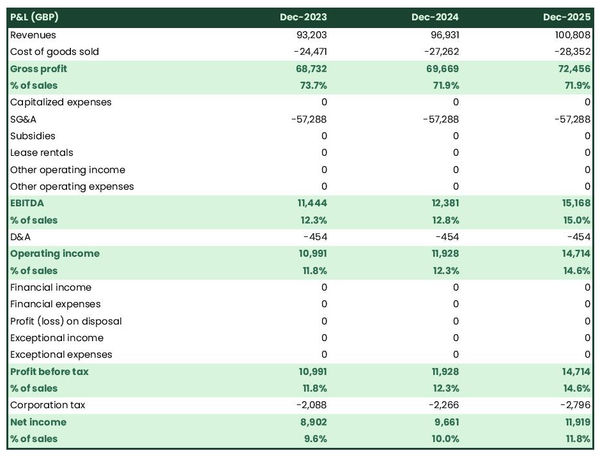
The projected balance sheet of your recording studio
The balance sheet of a recording studio is a financial statement that shows the total value of all the assets owned and liabilities owed by the company at any given point in time.
This document is essential for assessing the recording studio's overall financial health and stability: net worth, liquidity, and solvency.
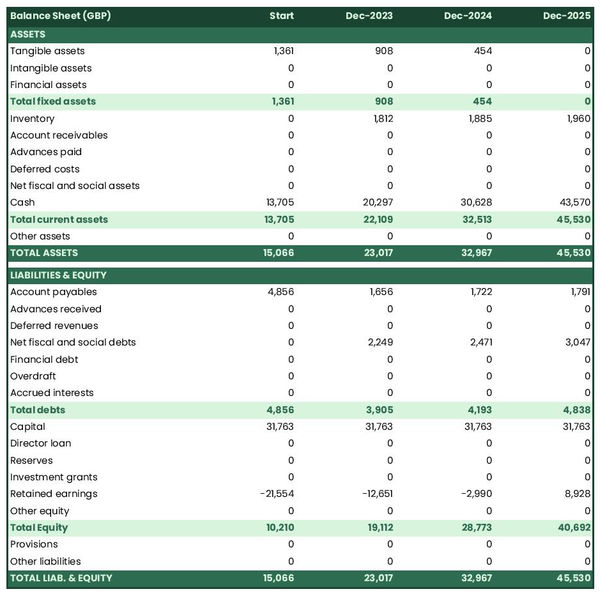
Your projected balance sheet will provide lenders, investors (and you the business owner) with insight into the current financial structure of the recording studio.
It shows exactly how much money has been invested in assets such as equipment and buildings, as well as liabilities like loans or accounts payable.
This helps determine whether the recording studio's operations can afford more debt. Additionally, it shows what kind of assets are available to be used as collateral when the recording studio seeks to take out a new loan.
Overall, looking at the balance sheet of a recording studio is important for understanding its financial structure and ensuring that it can meet its short-term and long-term financial commitments.
The projected cash flow statement
The projected cash flow statement of your recording studio is the table that shows how much money the studio expects to generate and consume.
It shows how much money they will have available for things like buying equipment, paying rent, and hiring staff.
Having an accurate projection of your cash flow will be key plan ahead and making sure your recording studio doesn't run out of money.
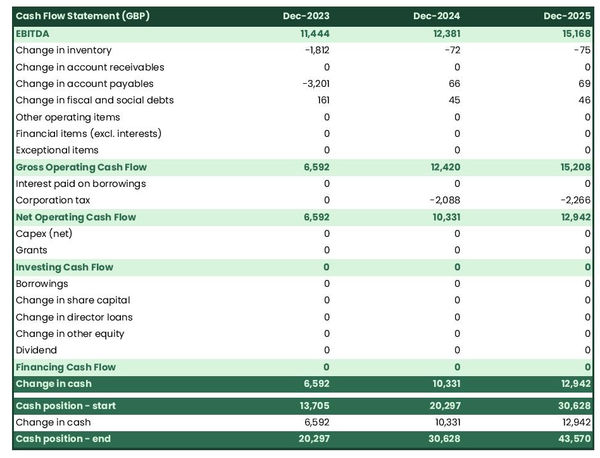
The initial financing plan
An initial financing plan, also known as a sources and uses table, is a helpful tool which shows how you will finance the creation (or expansion) of your recording studio.

Knowing exactly where the money will go help investors or lenders assess how the risk is split between financiers and the founding team.
Now that we have a good idea of what a comprehensive financial forecast for your recording studio looks like, let's take a look at the other part of the business plan which provides the reader with the context needed to understand and judge the quality of your forecast.
The written part of a recording studio business plan
The written part of a recording studio business plan usually consists of 7 comprehensive sections. Let's have a look at them
1. The executive summary
When writing an executive summary for a recording studio business plan, it is important to provide an overview of the business, the market, and key financials.
An effective executive summary should offer a concise snapshot of your business, including what services are offered, who the target customers are, any competitive advantages that you may have, and any key milestones that have been achieved.
When discussing the market overview, it is important to describe the overall size of your local market, any trends affecting potential growth and customer acquisition, and how your recording studio will be positioned in this competitive landscape.
Additionally, it is important for investors to get an idea of key financials such as revenue projections, cash-flow forecasts, and capital requirements.
Finally, your executive summary should include your ask: how much money you’re seeking and what lenders or investors will receive in return for their investment. This is a critical section of the business plan as it provides clarity on why someone would finance your recording studio.
2. The presentation of the company
When crafting the presentation of a company in a recording studio business plan, it is important to focus on three key elements:
- Structure & ownership,
- Location,
- and management team.
Structure & ownership is the section where you explain the legal structure of your company – whether it’s a sole proprietorship, partnership, limited liability company, etc. It’s also important to describe the ownership structure and list the equity stakes that have been issued so far.
Next is the presentation of the location of your studio, which should explain the rationale for choosing the physical location where your studio is located, as well as explaining how it suits your customer base.
For example, if you’re targeting local musicians, you may want to focus on the convenience of your studio’s location for potential customers.
Finally, the management team section is where you provide a brief description of the people behind your recording studio. This should include each individual’s qualifications as well as their experience in running a business and working within the music industry.
This section should also include any additional expertise or assets brought by members of your management team. Such as a good network of contacts in the local music scene, for example.
By providing clear information on the legal structure, ownership, location and management team behind your recording studio, you will give readers an understanding of who’s behind the project, where it’s located, and why they should believe in the team’s ability to make it successful.
3. The products and services section
When writing a business plan for a recording studio, it's important to include an accurate and comprehensive description of all the services you will offer.
This is especially true if you are hoping to secure financing from banks or investors who will want to understand how you are going to generate revenues.
When describing the products and services your recording studio offers, be sure to describe each item in detail including information on how they can help customers achieve their goals.
For example:
- If you offer sound engineering and production services, explain exactly what these entail such as mixing, mastering, vocal tuning and so on.
- If you provide additional audio equipment rental services or music lessons for aspiring artists then make sure that this is included too.
Be specific about what makes your offerings unique compared with other studios in the area so that potential financiers can see why yours may have more success than others.
Also try to keep it as jargon free as possible, as your reader might not be familiar with the terms commonly used in the music industry.
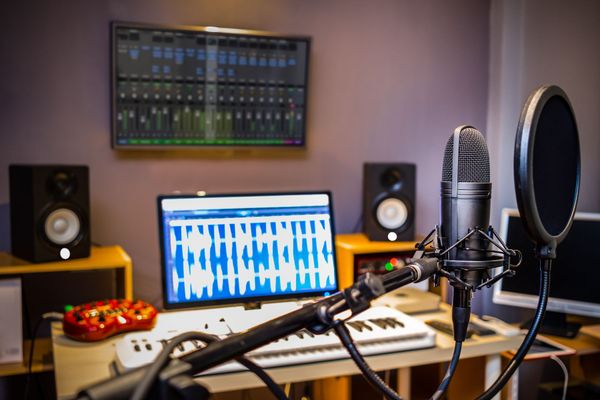
4. The market analysis
When presenting the conclusion of your market analysis in your recording studio's business plan, you should touch upon the following items: market demographics and segmentation, target market, competition, barriers at entry, and regulation.
These are all key components that will help paint a picture for potential banks or investors about the viability of the venture.
Demographics and segmentation provide insight into who is likely to use the services offered by the recording studio. This data can help inform decisions around pricing strategies as well as marketing campaigns targeted at specific customer segments.
Knowing one's target market also helps identify which channels are best suited for reaching them while also allowing more accurate predictions regarding sales volume.
It is also important to understand what other competitors offer in terms of similar services so that proper differentiation can be established between offerings.
Finally, understanding any regulations related to running such a business is critical since failure to comply with local laws could lead to hefty fines or worse yet - closure of your recording studio!
5. The strategy section
The strategy section of your recording studio business plan should include the following subsections:
- An analysis of your competitive edge
- Your pricing strategy,
- A detailed marketing plan,
- Your company's past and future milestones,
- And, last but not least, an assessment of risks and mitigants.
Each part is essential for convincing potential investors that the recording studio has what it takes to be successful in this highly competitive industry.
The first step is to articulate how your recording studio will stand out from its competitors. This can involve highlighting unique features or services that set it apart from other studios in the area, as well as analysing any advantages they may have over larger rivals such as lower overhead costs due to economies of scale or access to specialized equipment.
It’s also important for you - the business owner - to highlight why these factors are likely to play a critical part when customers choose where they will record music or voiceovers.
The second step is to present your pricing strategy and demonstrate why it is a sensible one.
You should consider the costs of running your studio, any discounts or other incentives you may offer customers, and how price points compare against competitors in the area.
The next part is your marketing plan which should outline how you will reach potential customers and build loyalty among your studio customers.
Then comes the milestones section, where you can highlight the key accomplishments to date, as well as any goals you plan to achieve in the future.
Finally, it is important to include an assessment of risks and mitigants so that potential investors are aware of what could go wrong, and how these issues could be addressed. This will help demonstrate that you have done your due diligence and can help instil confidence that the venture will be successful.
6. The operations section
The operations section of a recording studio business plan must provide information about staffing (and recruiting), opening hours, assets and intellectual property requirements, and suppliers.
When writing the staffing team section, it is essential to provide details about each role and how they will contribute to making the studio run smoothly. Start by introducing each team member, their role, and any qualifications or experience they bring to the studio. Then explain how you plan to recruit new staff if needed.
The opening hours section should clearly outline when your recording studio is open for business and when it is not available. This will help financiers understand how the studio operates and whether it is meeting customer demand.
The assets and intellectual property section should detail any key resources you depend on to run the studio, such as a long lease, recording equipment, software, or specialized tools. It should also include information about any intellectual property relevant to your business, such as copyrights or trademarks.
Finally, the suppliers section should explain which companies you plan to work with and why they are the best fit for your needs. Be sure to include information about their quality of service, cost-effectiveness, and commercial terms.
Overall, a detailed operations section in your recording studio business plan can give investors and financiers confidence that your studio is capable of success.
7. The presentation of the financial plan
This is where you will present the financial forecast that we talked about earlier in this guide.
Now that you have a better understanding of what should be included in the content of your recording studio's business plan, it’s time to look at the tools that can help you create one.
What tool should I use to write the business plan of my recording studio?
In this section, we will be reviewing the three main solutions for creating a recording studio business plan:
- Using Word and Excel,
- Hiring a consultant to write the plan,
- And using specialized online business plan software.
Create your recording studio business plan using Word or Excel
Creating a recording studio business plan using Word or Excel is a viable option for many business owners, although it does have a lot of cons.
The major advantages of using Excel and Word (or equivalent programs such as Google Docs) for creating a recording studio business plan is their low cost.
That said, there are quite a few cons to using Word and Excel for this purpose.
While creating a financial forecast on Excel might be cheap, it can also be time consuming and difficult for the average business owner to do accurately without expert accounting knowledge.
And, even if you manage to create an accurate and error free forecast on Excel, financiers might not believe you did.
Additionally, creating a recording studio business plan on Word requires starting from a blank page and spending hours on formatting.
Overall, while Word or Excel may be viable options for creating a recording studio business plan for some business owners, but it is by far not the best or most efficient solution.
Outsource your recording studio business plan to a consultant (or accountant)
Outsourcing the creation of your recording studio business plan to a consultant or accountant is an option that many business owners consider when they need help.
Here also, there are both pros and cons to this choice, so it’s important to weigh your options before making a decision.
On the plus side, they are used to writing business plans - both consultants and accountants are good at creating financial forecasts without errors - provided they get the right inputs from you, as accountants or generalist consultants may lack the industry expertise to forecast your sales accurately without guidance.
The main drawback is the cost, hiring a consultant or accountant is expensive, and there may be unexpected extra costs if the plan needs to be updated or modified later down the line.
Budget at least £1.5k ($2.0k) for a complete recording studio business plan, more if you need to make changes after the initial version (which happens frequently after the initial meetings with lenders).
Use an online business plan software for your recording studio business plan
Another alternative is to use online business plan software. There are several advantages to doing so:
- You are guided through the writing process by detailed instructions and examples for each part of the plan
- You can be inspired by already written business plan templates and examples
- You can easily make your financial forecast by letting the software take care of the financial calculations for you
- You get a professional document, formatted and ready to be sent to your bank or investors
- You can easily compare your actual financial performance to your forecast to ensure your business is on track
If you're interested in using this type of solution, you can try our software for free by signing up here.
We hope that this guide helped you to better understand how to write the business plan for your recording studio. Do not hesitate to contact us if you still have questions!
Also on The Business Plan Shop
- 6 ways to enhance the profitability of a tea room
- Business plan vs budget: what's the difference?
- How to choose the best business plan software for you
Know someone in the music industry? Share this article with them!



